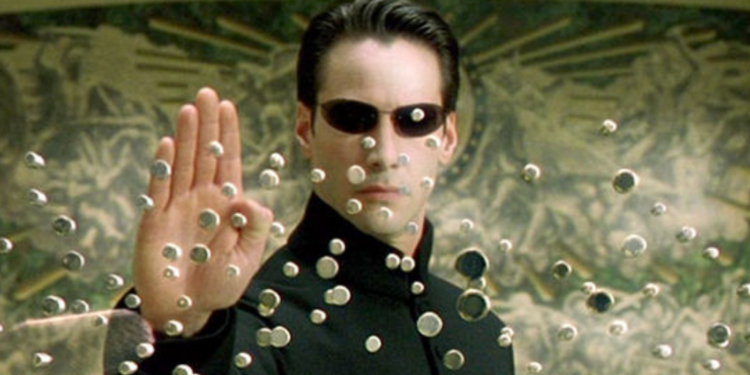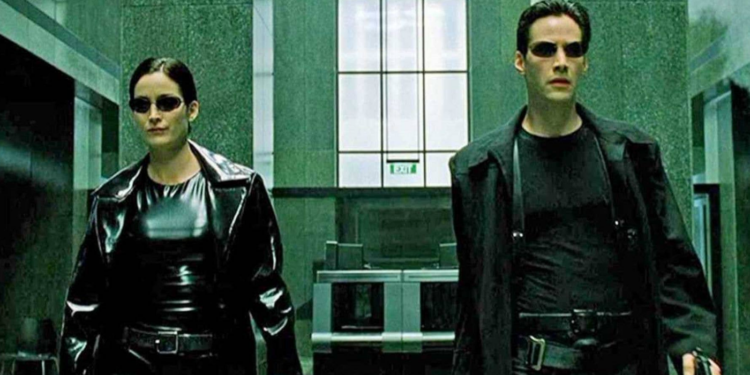The Matrix was released in 1999 and quickly became a cultural phenomenon. Written and directed by the Wachowski sisters, the film presents a groundbreaking and thought-provoking sci-fi epic that has captivated audiences worldwide. Now 25 years after its initial release, it is still widely regarded as a classic.
The Matrix‘s innovative special effects, intricate storyline, and philosophical themes resonated with both critics and audiences, earning widespread acclaim and commercial success. The film grossed an astonishing $467.2 million worldwide on a modest budget of $63 million, cementing its status as a modern classic and influencing countless other films, TV shows, and even music videos. So, let’s break down why this movie still holds up so well today.
The Matrix’s Unique Plot Created a Conversation That Still Resonates Today
The Matrix introduced a revolutionary premise that has since become a cultural phenomenon. The movie’s central idea posits that humanity is unknowingly trapped within a simulated reality created by intelligent machines to distract humans while their bodies are harvested for energy. The story follows Neo, played by Keanu Reeves, as he awakens to this harsh truth and joins a group of rebels fighting against the machines. The Matrix‘s unique concept sparked a global conversation about the dangers of artificial intelligence and its potential to manipulate and control humanity.
As AI technology advances, this theme has become increasingly relevant, with many experts warning about the risks of creating sentient machines that could potentially supplant human life. Interestingly, the notion that we may be living in a simulated reality, often referred to as the “Simulation Hypothesis,” has gained traction among some experts and enthusiasts, including video game designer Rizwan Virk, who discussed his beliefs on the Joe Rogan Experience podcast in 2024. The Matrix‘s influence on popular culture and its prescient warnings about AI have made it a timeless classic, continuing to resonate with audiences today.
How The Matrix Changed the Landscape of Both Sci-Fi and Action Movies

The Matrix was a cinematic game-changer that redefined the boundaries of special effects and action filmmaking. Despite its modest budget, the Wachowski‘s innovative approach to practical and special effects resulted in a visual feast that captivated audiences worldwide. The film’s use of hyper-slow motion, particularly in the iconic “bullet time” sequence, revolutionized the way action scenes were shot and edited. This technique, which allowed for breathtaking sequences of slow-motion martial arts and gunplay, became a staple of modern action films.
Moreover, The Matrix‘s fighting style, which combined elements of martial arts, acrobatics, and wire work, inspired a new generation of filmmakers and influenced the development of future action movies. The film’s frenetic pacing and intricate choreography raised the bar for action sequences, paving the way for a new wave of fast-paced, high-stakes action films. As a result, The Matrix has left an indelible mark on the film industry, influencing everything from science fiction blockbusters to martial arts flicks and beyond.
In 2024, The Matrix was screened at various cinemas across the globe to celebrate its 25th anniversary. The Guardian reviewed the movie for the second time, stating that it “holds up tremendously well” and that “nothing about the bullet-time effects or production design feels dated”. Considering the fact that action movies have made massive leaps and bounds since the release of The Matrix, this only cements the movie as a true classic even further.
How The Matrix Utilized Its Soundtrack for Further Pop Culture Appeal

It’s fair to say that not only has The Matrix stood the test of time, its soundtrack has as well. The main theme of The Matrix was Rob Dougan‘s pulse-pounding yet slow-grooving track, “Clubbed to Death”. By the time the movie was released, prior action movies typically relied on full orchestral soundtracks. Although The Matrix still had its own score, it was Rob Dougan’s electronic song that stood out.
The Matrix’s innovative use of electronic music in its soundtrack, featuring the iconic score by Don Davis and tracks by Marilyn Manson, Rage Against the Machine, and Propellerhead, broke new ground in the world of action and sci-fi filmmaking. The film’s bold decision to incorporate electronic and industrial sounds, rather than traditional orchestral scores, helped to create a sense of urgency and tension that perfectly complemented the movie’s futuristic and high-stakes narrative. This approach set a new precedent for filmmakers, encouraging them to think outside the box when selecting music for their own projects.
To that, The Matrix‘s influence can be seen in the many sci-fi and action films that have followed in its footsteps, with movies like Minority Report, V for Vendetta, and Inception all featuring electronic-infused soundtracks that clearly pay homage to the Wachowski’s groundbreaking work. Want to read about more movies with iconic soundtracks? Here are 10 soundtracks that became synonymous with their movies.
 Follow Us
Follow Us





